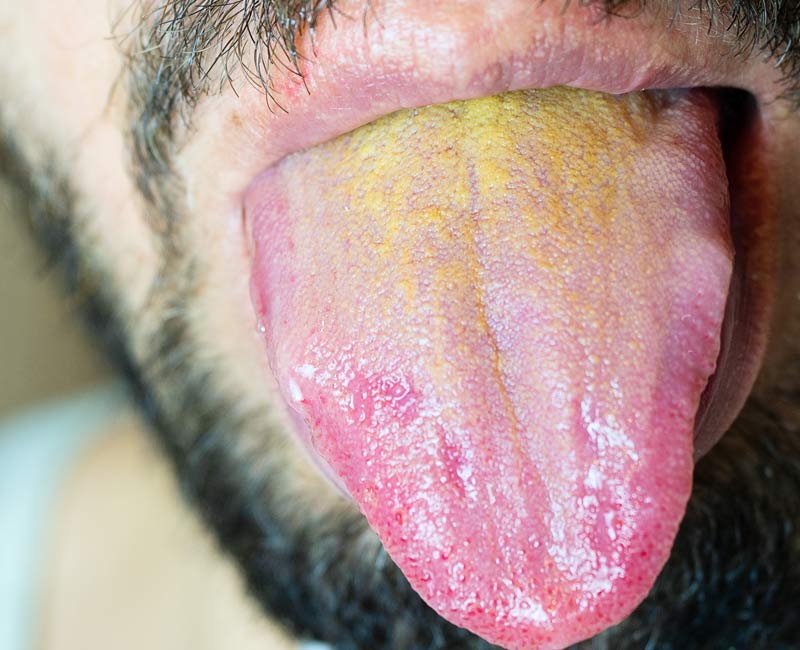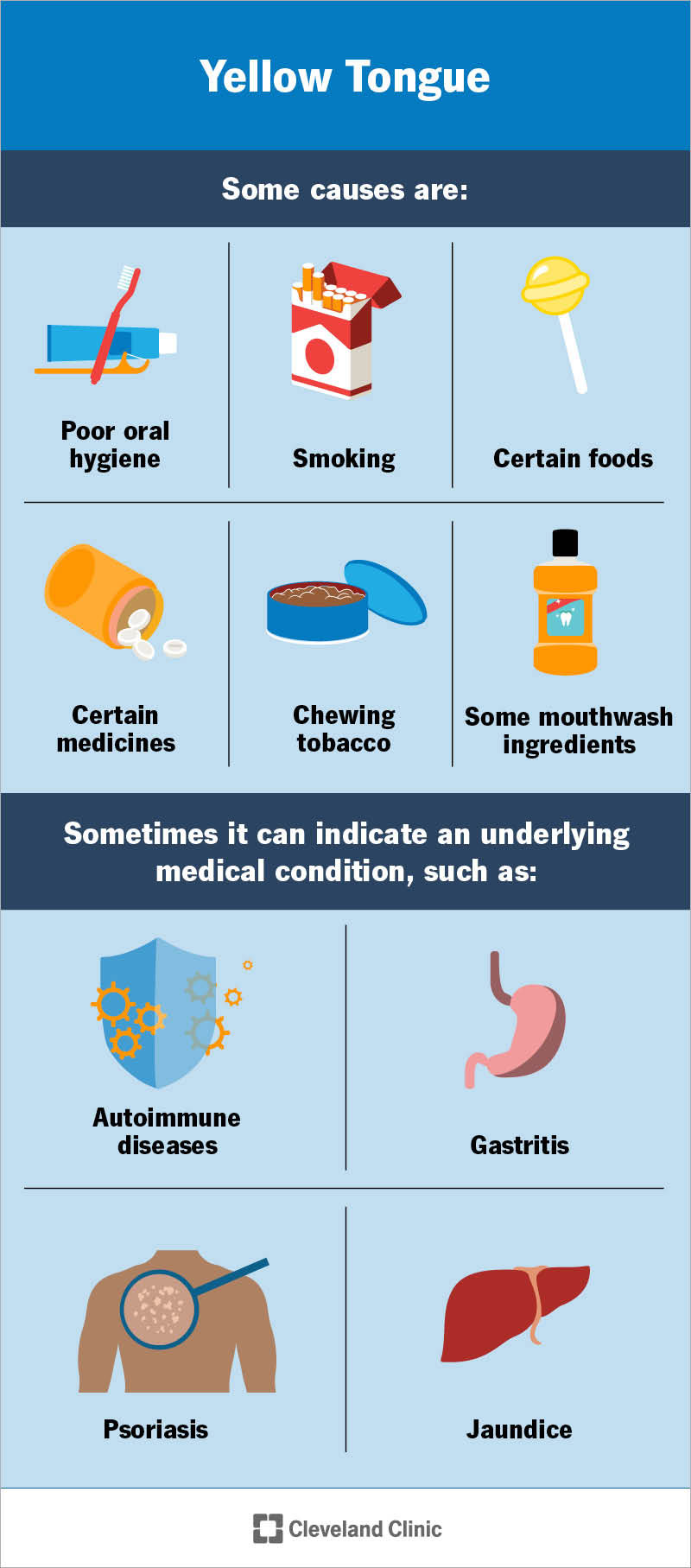Yellow tongue is discoloration of your tongue due to the buildup of dead skin cells. Most of the time, it’s the result of poor oral hygiene. People who use tobacco products or take certain medications are also more likely to develop yellow tongue. In most cases, yellow tongue is harmless. Improved oral hygiene usually fixes the issue.
Advertisement
Cleveland Clinic is a non-profit academic medical center. Advertising on our site helps support our mission. We do not endorse non-Cleveland Clinic products or services. Policy

Image content: This image is available to view online.
View image online (https://my.clevelandclinic.org/-/scassets/images/org/health/articles/21072-yellow-tongue.jpg)
Yellow discoloration of your tongue — or yellow tongue — is usually a harmless and temporary condition. A yellow tongue can mean many things. But it most often happens when dead skin cells get trapped in tiny, hair-like projections on your tongue called papillae. The dead skin cells build up. Things like food and tobacco can stain the cells odd colors (like yellow).
Advertisement
Cleveland Clinic is a non-profit academic medical center. Advertising on our site helps support our mission. We do not endorse non-Cleveland Clinic products or services. Policy
Taking better care of your oral hygiene usually gets rid of a yellow tongue in this case.
Rarely, a yellow coating on your tongue means something more serious, like jaundice or an autoimmune disease. If this is the case, a healthcare provider can prescribe treatments that can help.

Image content: This image is available to view online.
View image online (https://my.clevelandclinic.org/-/scassets/images/org/health/articles/yellow-tongue.jpg)
Usually, the only symptom is a tongue with a yellow coating. Depending on what’s causing it, you may also have:
Yellow tongue may indicate a condition called black hairy tongue. This syndrome occurs when a protein called keratin builds up on the surface of your tongue.
Sometimes, an overgrowth of bacteria on your tongue is the cause. This buildup can make your tongue appear hairy.
Other causes include:
Sometimes, yellow tongue indicates an underlying medical condition, like:
Advertisement
Often, dentists find yellow tongue symptoms during routine dental exams. Routine dentist visits are your first line of defense against issues that affect your teeth, gums and tongue.
In most cases, proper oral hygiene practices get rid of yellow tongue. A toothbrush or tongue scraper may help remove buildup on the surface of your tongue.
If your yellow tongue is a sign of a medical condition, your healthcare provider will suggest treatments to address it.
Reach out to a provider if you:
Yellow tongue is usually harmless and goes away with good oral hygiene.
When yellow tongue is a sign of a serious medical condition, your outlook depends on what’s causing it. Managing the condition usually improves symptoms.
Usually, yes. Proper oral hygiene is the best way to prevent yellow tongue. For best results, you should:
Finally, if you smoke, talk to a healthcare provider about ways to stop.
It’s possible but not common. One of the first signs of liver disease is jaundice, or yellowing of your skin. It happens when your liver is unable to get rid of bilirubin, a yellow substance in your blood. The yellowing is usually more noticeable in your skin and eyes. Rarely, it can affect your tongue.
If the only symptom is a yellow tongue, the problem likely has more to do with your dental routine than your liver. Liver failure usually involves other symptoms, like nausea, vomiting and belly pain.
Yellow tongue can look alarming, but it’s usually not harmful. Most of the time, it goes away with good oral hygiene practices. But if you have yellow tongue even with regular dental care, schedule an appointment with a dentist. They can find out why you have yellow tongue and recommend the right treatment.
Advertisement

Sign up for our Health Essentials emails for expert guidance on nutrition, fitness, sleep, skin care and more.
Learn more about the Health Library and our editorial process.
Cleveland Clinic’s health articles are based on evidence-backed information and review by medical professionals to ensure accuracy, reliability and up-to-date clinical standards.
Cleveland Clinic’s health articles are based on evidence-backed information and review by medical professionals to ensure accuracy, reliability and up-to-date clinical standards.
Dentistry plays an important role in oral health. Cleveland Clinic’s experts can design a personalized plan that will keep you smiling for the long haul.
